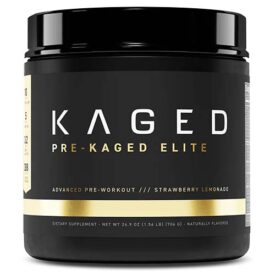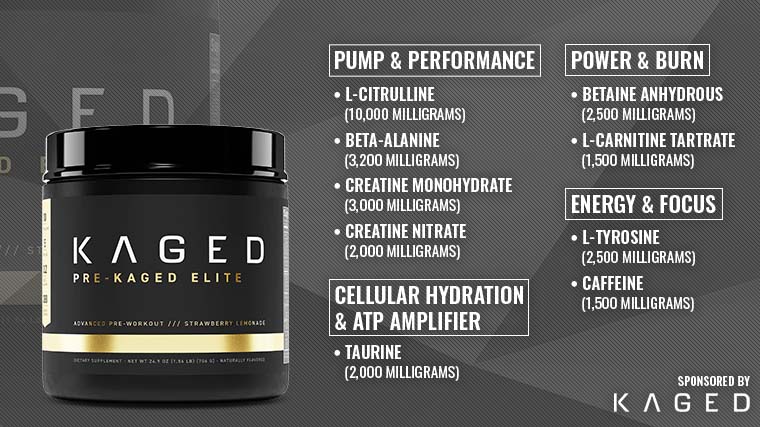With the mountains upon mountains of supplements available to gym-goers these days, it can be challenging to decide which is best for your goals. Finding the right pre-workout with the optimal configuration of ingredients can be all the more challenging.
Before exercise, pre-workouts have been shown to improve anaerobic capacity and power significantly. (1) However, not all pre-workouts are designed alike. Pre-workout formulas can vary, and if you’re pulling hard-earned dollars out of your wallet for supplements, it’s best to know that the ingredients on the nutrition label translate to gains in the gym.
So what are some of the things to look for in a top-tier pre-workout? We’re going to break down several ingredients that have proven effective in pre-workout supplements, many of which are in Kaged’s Pre-Kaged® Elite pre-workout supplement and the benefits they could have for advanced lifters.

Pre-Kaged® Elite provides nine patented ingredients with 35 milligrams of vitamin B6 and 1,000 micrograms of vitamin B12 in a single 36-gram scoop. Each serving is 25 calories and includes caffeine, taurine, l-citrulline, beta-alanine, l-tyrosine, and two types of creatine.
What’s In Pre-Kaged® Elite?
A single 36-gram scoop of Pre-Kaged® Elite pre-workout packs 25 calories and some pretty potent boosts of vitamins B6 (35 milligrams) and B12 (1,000 micrograms) — 2059% and 41,667% of the daily recommended value, respectively. The former is involved in amino acid metabolism, and the latter is required for the function of the central nervous system (CNS) and chronic disease prevention. (2)(3)
Additionally, there are nine patented ingredients in its formula simplified to the following:
- L-Citrulline (10,000 milligrams)
- Beta-Alanine (3,200 milligrams)
- Creatine Monohydrate (3,000 milligrams)
- Creatine Nitrate (2,000 milligrams)
- Betaine Anhydrous (2,500 milligrams)
- L-Carnitine Tartrate (1,500 milligrams)
- Taurine (2,000 milligrams)
- L-Tyrosine (2,500 milligrams)
- Caffeine (388 milligrams)
The above ingredients are spread into four categories by Pre-Kaged® Elite:
- Pump & Performance
- Power & Burn
- Cellular Hydration & ATP Amplifier
- Energy & Focus
Before diving into the benefits of each ingredient individually, it’s worth noting that the combination of them in one pre-workout is likely positive. The Journal of the International Society of Sports Nutrition found that chronic consumption of a multi-ingredient pre-workout combined with resistance training “appears to augment beneficial changes in body composition through increased lean mass accretion.” (4)
Additionally, an example blend of ingredients that includes “caffeine, creatine, beta-alanine, [and] amino acids…may elicit a synergistic effect on acute exercise performance and subsequent training adaptations compared to single ingredients alone.” In Layman’s terms, your training in the gym is likely to improve if you consume a multi-ingredient pre-workout beforehand rather than taking only one ingredient. (5)
Pump & Performance
The first ingredient category consists of the following four components:
A lifter’s “pump” is slang for the temporary hypertrophy of muscles — when muscle protein synthesis exceeds muscle protein breakdown — due to resistance training. All in all, this combination of ingredients fulfills the role of improving performance and, thereby, potentially providing a legitimate “pump.” Here’s a breakdown of each ingredient:
L-Citrulline
Research supports that L-citrulline can enhance exercise performance and recovery by increasing arginine and nitrite concentrations. L-arginine is a semi-essential amino acid responsible for nitric oxide production, which reduces blood pressure. (6)(7)(8)(9)
A randomized control trial in the Journal of Strength and Conditioning Research has shown that those who took a single eight-gram dose of citrulline malate before training could lift more than 50 percent more repetitions than their placebo counterparts. Additionally, citrulline can reduce muscle soreness by 40 percent in the 48 hours post-exercise. (10)
Beta-Alanine
Beta-alanine is an amino acid shown to impact physical performance positively. More specifically, it “elicits a significant ergogenic effect on high-intensity exercise…[during] exercise [that] lasts between one and four minutes,” according to Amino Acids. (11)(12)
Over a 24-week period, male subjects who consumed 6.4 grams of beta-alanine daily had better exercise capacity at a higher intensity than those who took a placebo. That dose has also been shown to improve one-rep max lifts in the barbell squat, barbell step-up, and loaded jumping lunge, and a better average and maximal power output. (13)(14)
Creatine Monohydrate
Creatine monohydrate is exceptionally well studied; it improves muscular performance during short-duration, high-intensity resistance exercises. Adequate dosing is 0.1 to 0.3 grams per kilogram of body weight per day. (15)(16)
The data supporting creatine is so vast that the International Society of Sports Nutrition views restricting athletes’ use of creatine subjects them to a greater risk of injury. It is their position that creatine is “the most effective ergogenic nutritional supplement currently available to athletes with the intent of increasing high-intensity exercise capacity and lean body mass during training.” For reference, ergogenic is defined as “intended to enhance physical performance, stamina, or recovery.”(17)
Creatine Nitrate
In doses up to six grams per day, creatine nitrate can produce performance benefits similar to creatine monohydrate. For reference, creatine monohydrate is creatine molecules bound to water. Creatine nitrate is that same molecule with the addition of nitrate (salt).
Creatine nitrate has been shown to improve bench press lifting volume and power by generating higher glycogen concentration and lower lactic acid concentration. (18)(19)(20)
Additionally, creatine nitrate may benefit a one-rep max in lower body lifts, such as the leg press, and improve muscular endurance for those movements. (21)
Power & Burn
The second ingredient category of Pre-Kaged® Elite is comprised of two components:
- Betaine Anhydrous (2,500 milligrams)
- L-Carnitine Tartrate (1,500 milligrams)
Kaged’s labeling is, again, pretty accurate here. For clarity, strength and power are different things. Strength is the ability to withstand applied stress or load, while power is the amount of energy transference.
Betaine Anhydrous
Betaine Anhydrous is a naturally occurring chemical in the body (also found in seafood, wheat germ, spinach). It’s been shown to significantly improve body composition, work capacity, and power (again, not strength) over a six-week period using a 2.5-gram dose — the exact amount in a single serving of Pre-Kaged® Elite. (22)(23)
L-Carnitine Tartrate
Although listed in the “Power and Burn” section, it’s possible L-carnitine tartrate would serve well under an “Improved Recovery” section. The Journal of Strength and Conditioning Research found that consumption of L-carnitine tartrate ”reduced the amount of exercise-induced muscle tissue damage” during a recovery period following high-volume squat sessions consisting of five sets of 15-20 reps. (24)
Furthermore, L-carnitine tartrate has been shown to optimize the processes of muscle tissue repair during recovery post resistance training. These results were tested on subjects consuming two grams of L-carnitine tartrate per day — not far from Pre-Kaged® Elite’s 1,500 milligrams per serving. (25)
Cellular Hydration & ATP Amplifier
The third category on Pre-Kaged® Elite’s nutrition label includes three ingredients, including coconut fruit water powder and Ancient Peat and apple fruit extract, but the third one is worth diving into:
- Taurine (2,000 milligrams)
Taurine does offer some hydration benefits, but that is relatively broad as hydration can mean many things, so let’s get specific.
Taurine
Taurine is distributed to various tissues to regulate ion channels (proteins that allow ions to pass through pores), the water volume in a cell, and membrane stabilization ( for pain management). Data suggests it helps with skin hydration in dry environments and that it can lower lactate levels if consumed before or after resistance training. (26)(27)(28)
Lactate forms when pyruvate (salt) formation exceeds pyruvate oxidation (oxygen) in the muscles. During endurance exercise, this is essentially the body fatiguing. Taurine potentially lowering lactate levels means that the onset of fatigue could be delayed — a meaningful benefit when training. (29)
Energy & Focus
The final category is “Energy and Focus,” which contains two ingredients we’ll unpack:
- L-Tyrosine (2,500 milligrams)
- Caffeine (388 milligrams)
Kaged has a caffeine-only supplement called PurCaf® caffeine, which is used in Pre-Kaged® Elite.
L-Tyrosine
According to the Journal of Psychiatric Research, this amino acid is a precursor to dopamine and norepinephrine (a neurotransmitter) and seems to enhance cognitive performance effectively. This potential prevention of cognitive decline is particularly the case during short-term stressful situations or physical stressors when dopamine and norepinephrine are depleted. (30)(31)
Caffeine
The amount of caffeine included in Pre-Kaged® Elite is approximately equivalent to four cups of coffee. Caffeine is known to improve an athlete’s performance, notably helping increase the number of repetitions to failure in both upper and lower-body exercises. (32)(33)
[Read More: The Best Upper Body Exercises and Workouts]
Another notable benefit of consuming caffeine before training is the improvement in readiness. According to The Journal of Sports Medicine and Physical Fitness, caffeine has been shown to increase a lifter’s “readiness to invest in both physical and mental effort.”
The Final Product
After a thorough breakdown of the nutrition label on Kaged’’s Pre-Kaged® Elite pre-workout, it is pretty clear that the combination of ingredients is well chosen.

Pre-Kaged® Elite provides nine patented ingredients with 35 milligrams of vitamin B6 and 1,000 micrograms of vitamin B12 in a single 36-gram scoop. Each serving is 25 calories and includes caffeine, taurine, l-citrulline, beta-alanine, l-tyrosine, and two types of creatine.
They target the areas of improvement that Kaged is transparently aiming to help athletes achieve. The doses are within a reasonable range of what science suggests is effective for those goals.
References
- Martinez, N., Campbell, B., Franek, M., Buchanan, L., & Colquhoun, R. (2016). The effect of acute pre-workout supplementation on power and strength performance. Journal of the International Society of Sports Nutrition, 13, 29. https://doi.org/10.1186/s12970-016-0138-7
- Spinneker, A., Sola, R., Lemmen, V., Castillo, M. J., Pietrzik, K., & González-Gross, M. (2007). Vitamin B6 status, deficiency and its consequences–an overview. Nutricion hospitalaria, 22(1), 7–24.
- Office of Dietary Supplements – Vitamin B12. (2022). Retrieved 25 January 2022, from https://ods.od.nih.gov/factsheets/VitaminB12-HealthProfessional/
- Harty, P., Zabriskie, H., Erickson, J., Molling, P., Kerksick, C., & Jagim, A. (2018). Multi-ingredient pre-workout supplements, safety implications, and performance outcomes: a brief review. Journal Of The International Society Of Sports Nutrition, 15(1). doi: 10.1186/s12970-018-0247-6
- Harty, P., Zabriskie, H., Erickson, J., Molling, P., Kerksick, C., & Jagim, A. (2018). Multi-ingredient pre-workout supplements, safety implications, and performance outcomes: a brief review. Journal Of The International Society Of Sports Nutrition, 15(1). doi: 10.1186/s12970-018-0247-6
- Krzysztofik, Wilk, Wojdała, & Gołaś. (2019). Maximizing Muscle Hypertrophy: A Systematic Review of Advanced Resistance Training Techniques and Methods. International Journal Of Environmental Research And Public Health, 16(24), 4897. doi: 10.3390/ijerph16244897
- Gonzalez, A., & Trexler, E. (2020). Effects of Citrulline Supplementation on Exercise Performance in Humans: A Review of the Current Literature. Journal Of Strength And Conditioning Research, 34(5), 1480-1495. doi: 10.1519/jsc.0000000000003426
- McRae, M. (2016). Therapeutic Benefits of l-Arginine: An Umbrella Review of Meta-analyses. Journal Of Chiropractic Medicine, 15(3), 184-189. doi: 10.1016/j.jcm.2016.06.002
- Ma, L., Hu, L., Feng, X., & Wang, S. (2018). Nitrate and Nitrite in Health and Disease. Aging And Disease, 9(5), 938. doi: 10.14336/ad.2017.1207
- Pérez-Guisado, J., & Jakeman, P. (2010). Citrulline Malate Enhances Athletic Anaerobic Performance and Relieves Muscle Soreness. Journal Of Strength And Conditioning Research, 24(5), 1215-1222. doi: 10.1519/jsc.0b013e3181cb28e0
- Trexler, E., Smith-Ryan, A., Stout, J., Hoffman, J., Wilborn, C., & Sale, C. et al. (2015). International society of sports nutrition position stand: Beta-Alanine. Journal Of The International Society Of Sports Nutrition, 12(1). doi: 10.1186/s12970-015-0090-y
- Hobson, R., Saunders, B., Ball, G., Harris, R., & Sale, C. (2012). Effects of β-alanine supplementation on exercise performance: a meta-analysis. Amino Acids, 43(1), 25-37. doi: 10.1007/s00726-011-1200-z
- SAUNDERS, B., DE SALLES PAINELLI, V., DE OLIVEIRA, L., DA EIRA SILVA, V., DA SILVA, R., & RIANI, L. et al. (2017). Twenty-four Weeks of β-Alanine Supplementation on Carnosine Content, Related Genes, and Exercise. Medicine & Science In Sports & Exercise, 49(5), 896-906. doi: 10.1249/mss.0000000000001173
- Maté-Muñoz, J., Lougedo, J., Garnacho-Castaño, M., Veiga-Herreros, P., Lozano-Estevan, M., & García-Fernández, P. et al. (2018). Effects of β-alanine supplementation during a 5-week strength training program: a randomized, controlled study. Journal Of The International Society Of Sports Nutrition, 15(1). doi: 10.1186/s12970-018-0224-0
- Hall, M., & Trojian, T. (2013). Creatine Supplementation. Current Sports Medicine Reports, 12(4), 240-244. doi: 10.1249/jsr.0b013e31829cdff2
- Antonio, J., Candow, D., Forbes, S., Gualano, B., Jagim, A., & Kreider, R. et al. (2021). Common questions and misconceptions about creatine supplementation: what does the scientific evidence really show?. Journal Of The International Society Of Sports Nutrition, 18(1). doi: 10.1186/s12970-021-00412-w
- Kreider, R., Kalman, D., Antonio, J., Ziegenfuss, T., Wildman, R., & Collins, R. et al. (2017). International Society of Sports Nutrition position stand: safety and efficacy of creatine supplementation in exercise, sport, and medicine. Journal Of The International Society Of Sports Nutrition, 14(1). doi: 10.1186/s12970-017-0173-z
- Galvan, E., Walker, D., Simbo, S., Dalton, R., Levers, K., & O’Connor, A. et al. (2016). Acute and chronic safety and efficacy of dose dependent creatine nitrate supplementation and exercise performance. Journal Of The International Society Of Sports Nutrition, 13(1). doi: 10.1186/s12970-016-0124-0
- Joy, J., Lowery, R., Falcone, P., Mosman, M., Vogel, R., & Carson, L. et al. (2014). 28 days of creatine nitrate supplementation is apparently safe in healthy individuals. Journal Of The International Society Of Sports Nutrition, 11(1). doi: 10.1186/s12970-014-0060-9
- Duan, B., Xu, J., Xing, T., Li, J., Zhang, L., & Gao, F. (2022). Creatine nitrate supplementation strengthens energy status and delays glycolysis of broiler muscle via inhibition of LKB1/AMPK pathway. Poultry Science, 101(3), 101653. doi: 10.1016/j.psj.2021.101653
- Dalton, R., Sowinski, R., Grubic, T., Collins, P., Coletta, A., & Reyes, A. et al. (2017). Hematological and Hemodynamic Responses to Acute and Short-Term Creatine Nitrate Supplementation. Nutrients, 9(12), 1359. doi: 10.3390/nu9121359
- Craig, S. (2004). Betaine in human nutrition. The American Journal Of Clinical Nutrition, 80(3), 539-549. doi: 10.1093/ajcn/80.3.539
- Cholewa, J., Wyszczelska-Rokiel, M., Glowacki, R., Jakubowski, H., Matthews, T., & Wood, R. et al. (2013). Effects of betaine on body composition, performance, and homocysteine thiolactone. Journal Of The International Society Of Sports Nutrition, 10(1). doi: 10.1186/1550-2783-10-39
- WJ, K., JS, V., DN, F., MR, R., MJ, S., & AL, G. et al. (2003). The effects of L-carnitine L-tartrate supplementation on hormonal responses to resistance exercise and recovery. Journal Of Strength And Conditioning Research, 17(3). Retrieved from https://pubmed.ncbi.nlm.nih.gov/12930169/
- WJ, K., JS, V., DN, F., MR, R., MJ, S., & AL, G. et al. (2003). The effects of L-carnitine L-tartrate supplementation on hormonal responses to resistance exercise and recovery. Journal Of Strength And Conditioning Research, 17(3). Retrieved from https://pubmed.ncbi.nlm.nih.gov/12930169/
- Schaffer, S., & Kim, H. (2018). Effects and Mechanisms of Taurine as a Therapeutic Agent. Biomolecules & Therapeutics, 26(3), 225-241. doi: 10.4062/biomolther.2017.251
- Siefken, W., Carstensen, S., Springmann, G., Wittern, K., Wenck, H., & Stäb, F. et al. (2003). Role of Taurine Accumulation in Keratinocyte Hydration. Journal Of Investigative Dermatology, 121(2), 354-361. doi: 10.1046/j.1523-1747.2003.12366.x
- Chen, Q., Li, Z., Pinho, R., Gupta, R., Ugbolue, U., Thirupathi, A., & Gu, Y. (2021). The Dose Response of Taurine on Aerobic and Strength Exercises: A Systematic Review. Frontiers In Physiology, 12. doi: 10.3389/fphys.2021.700352
- Stallknecht, B., Vissing, J., & Galbo, H. (2007). Lactate production and clearance in exercise. Effects of training. A mini-review. Scandinavian Journal Of Medicine & Science In Sports, 8(3), 127-131. doi: 10.1111/j.1600-0838.1998.tb00181.x
- Jongkees, B., Hommel, B., Kühn, S., & Colzato, L. (2015). Effect of tyrosine supplementation on clinical and healthy populations under stress or cognitive demands—A review. Journal Of Psychiatric Research, 70, 50-57. doi: 10.1016/j.jpsychires.2015.08.014
- Young, S. (2007). L-Tyrosine to alleviate the effects of stress?. Journal Of Psychiatry & Neuroscience, 32(3), 224. Retrieved from https://www.ncbi.nlm.nih.gov/pmc/articles/PMC1863555/
- Stavric, B., Klassen, R., Watkinson, B., Karpinski, K., Stapley, R., & Fried, P. (1988). Variability in caffeine consumption from coffee and tea: Possible significance for epidemiological studies. Food And Chemical Toxicology, 26(2), 111-118. doi: 10.1016/0278-6915(88)90107-x
- VL, D., FR, M., NE, Z., F, G., MJ, D., & L, G. (2015). Effects of acute caffeine ingestion on resistance training performance and perceptual responses during repeated sets to failure. The Journal Of Sports Medicine And Physical Fitness, 55(5). Retrieved from https://pubmed.ncbi.nlm.nih.gov/26068323/

